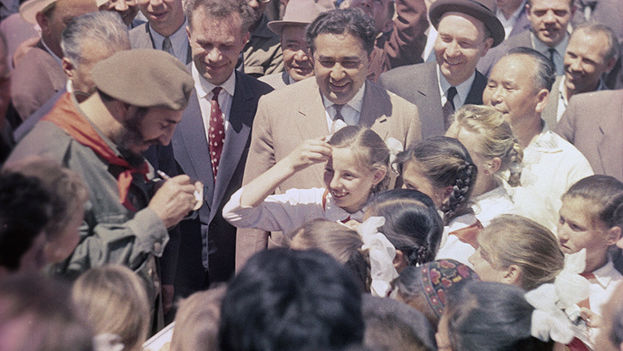
In just a few months the great empire had crumbled without its archenemy the United States firing a single shot.
14ymedio, Yoani Sanchez, Havana, 7 November 2017 — It was bath time after an afternoon of pulling weeds around tiny lettuce plants. The high school dorm was a coming and going of teenagers with towels on their shoulders and a piece of soap in their hands. The shout came from a bunk near my bed: “I have Russian candies and they are the last ones.”
The year was 1991 and the Soviet Union was in its final stretch. In just a few months the great empire had crumbled without its archenemy the United States firing a single shot. In Cuba, Russian technicians left in torrents and the buildings they had once occupied in Havana’s Alamar neighborhood were left empty. The worst was yet to come.
Olga, a 15-year-old teenager from Guantánamo, was reselling, at our “school in the countryside,” the goods that the wives of those Soviet workers had given her. For months, she supplied the dorm with candy, cookies and personal hygiene products, a variety of merchandise that contrasted with the empty shelves in the official stores.
Prices were high and Cuban money was worth less and less. We handed over those bills with the faces of the heroes of independence in exchange for a flavor that would transport us away from the monotonous trays in the boarding school cafeteria. The impromptu saleswoman did not know it, but she was bringing us pieces of a country that was about to collapse.
Days before that March afternoon when Olga offered the few candies she had left, in the USSR a popular referendum had been held on the proposed Union of Sovereign States to transform the giant federation into one of less centralized republics. The Cuban press was sparing in the details, but there was a whiff in the air, the smell of an end of an era.
Oblivious to politics and concentrated on filling our stomachs, the students of the Socialist Republic of Romania High School, deep in the Cuban countryside in the municipality of Alquízar, witnessed an unprecedented change in our lives. In the classrooms, until then, busts of José Martí had alternated with images of Vladímir Ilich Lenin, and at night some students rolled their cigarettes using pages torn from books on Marxism.
The USSR had always been there, throughout our brief existence. How could we imagine that this would change? We had grown up surrounded by all the symbolism of the October Revolution: its hammer and sickle, the dictatorship of the proletariat and the repeated phrase that humanity was in the stage of “transition from capitalism to socialism.” It was just a matter of time before the promised future arrived.
Instead, the Soviet presence was declining. My family kept some cans of condensed milk in a drawer, the last vestige that reached our tables of what had been “the fair exchange” between the island and the countries of the socialist bloc. On the screens of our poorly-made television sets, a frantic Fidel Castro was beginning to recognize that we might run out of bolos, bowling pins, as we were wont to call those powerful comrades, our fellow travelers.
That March afternoon I bought only a strawberry and a mint candy. They came in brightly colored papers with small diamonds. I unfolded one of those wrappers and stuck it on the underside of the bunk that I stared at when I went to bed. I looked at it every night trying to decipher a hidden form that escaped me.
In those tiny figures I could see the dome of the cathedrals of St. Basil in Moscow, snowflakes with bizarre structures, the tops of some trees and even the silhouette of a huge bear. I fell asleep imagining that I was waking up in a dacha or skiing on a frozen lake.
June arrived, I finished the exams and went home. For the first time the Russians chose a president: Boris Yeltsin. Shortly afterwards, George HW Bush visited Moscow and signed a historic treaty to reduce the nuclear arsenal of both superpowers. The official press barely touched on that surprising turn of events for which Fidel Castro coined a word: the desmerengamiento – literally the ‘cake-melting’ – the final collapse of the USSR.
During those school holidays I visited several classmates who lived in Alamar, east of Havana. Olga had moved with her family to one of the apartments emptied by the Russians in their stampede. They had forced the door and entered illegally, like the rest of the occupants of the building.
It was August and the beach near the concrete blocks was a blue plate without waves. We went for a swim and a while later the father of another teenager came running to report that a coup had broken out to overthrow Gorbachev and “avoid the decomposition of the country.”
“Now the bolos are going to return, for sure,” added the man. A cheerful uproar from hungry young people, eager to have the candy and the cans of milk back, went on for several minutes; but the Soviets never returned. Or at least not as before.
